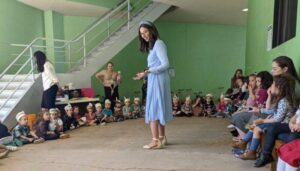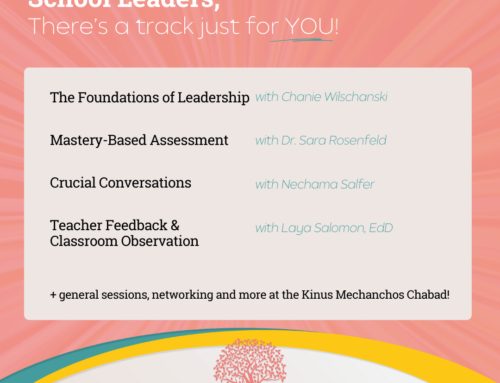 “Meet the Chinuch Shluchim” is jointly presented by the Menachem Education Foundation (MEF) and COLlive.com Community News Service. The series features Chabad teachers from different states, countries, and demographics speaking about their life and Chinuch Shlichus.
“Meet the Chinuch Shluchim” is jointly presented by the Menachem Education Foundation (MEF) and COLlive.com Community News Service. The series features Chabad teachers from different states, countries, and demographics speaking about their life and Chinuch Shlichus.
This Week: Mrs. Chaya Bracha Rubin teaches 3rd, 6th, and 8th grades, as well as high school, at Maimonides Hebrew Day School (MHDS) in Albany, New York. She teaches the subjects of English, Creative Parsha, and Navi. She once dreamed of becoming a poetry professor, but soon discovered the joys of helping children find avenues for creative expression through Torah learning. Plus, she sings!
Can you tell us a little about yourself?
Baruch Hashem, I am a mother of three children KA”H, and raising a family together with my husband is the greatest privilege and blessing of my life.
I enjoy nature and outdoor adventures with my kids when I can, but we also spend time on home projects together like baking, gardening, and small home activities that they can help with.
Can you share a little of your journey to becoming a teacher?
I wanted to be a teacher ever since I was in first grade. I remember once understanding a lesson while my friend did not. She was so upset and she looked like she was about to cry. I was able to explain the lesson in a different way than the teacher had, and my friend’s sense of relief and confidence was palpable to me. I thought, “Wow, I could be a teacher one day!” That really planted the seed.
As I got older and discovered a love for writing, I decided I wanted to be a poetry professor. I was in university pursuing my English degree when I found a work-study job in a Montessori school. After helping 2-6 year-olds as a literacy specialist, I became totally hooked and decided to train as a Montessori teacher after college.
I became frum in college (Penn State – with the Meretsky family of Shluchim) and during that process, I had my first taste of working with frum children. I worked as an intern for my shluchim, reading with their kids, and planning educational events and activities for them. I was just learning Aleph-Beis myself so I was a bit limited in my resources. The Rebbe teaches that “if you know Aleph, teach Aleph.” I was really empowered to embody that teaching with my students as I taught what I knew.
I took a long break from teaching after college when I went to seminary and became a kallah. After meeting my husband in Ithaca NY at the Chabad House of Rabbi Eli and Chana Silberstein, we got married in Crown Heights and lived in Israel. My husband and I returned to the US so he could finish his Ph.D. program at Cornell and it was there that I got a taste of my dream job. Cornell University hired me to lead a poetry and creative writing workshop for emerging teen writers. I loved every minute of it and was sad to leave the position. But I had no idea that the incredible Shlichus of Chinuch was just around the corner for me!
How did you start teaching in a Chabad school?
When my husband and I moved to Albany, New York there were no job openings at MHDS. So I worked at the local JCC in early childhood education. After about a year, Principal Morah Rochel Rubin and the High School Principal Leyee Rubin (of Bnos Chaya) came up with a brilliant idea for a class that I could teach.
They called it “Creative Parsha,” where I could incorporate creative expression alongside relevant lessons from the weekly Sedra. Over the years, I’ve taught many versions of this class for different grades. Besides learning Parsha, the idea is for students to express their own interpretation of an element of the lesson through art, poetry, non-fiction or fiction writing, and even acting/short skits.
What is your favorite part of teaching?
I am extremely passionate about learning Torah and connecting with others. I feel it is such a zchus to be Jewish, every time I learn Torah (especially Chassidus) it energizes me. I hope to inspire my students to feel the same, to look for Hashem in their lives, and to develop a feeling of closeness to Him.
My favorite part of teaching is when I’m able to see a spark of understanding, joy, and relief in a student’s face when they answer a question correctly or get a concept that they were struggling with. It builds their confidence and sense of self-worth.
Are there any other hobbies that you enjoy?
I’m a classically trained singer and public speaker. I attended Philadelphia High School for Creative and Performing Arts and have been writing my own songs since I was young. I sing niggunim, classic, and modern Jewish songs, and my original songs for audiences in Israel and the USA. I have performed in New York, Pennsylvania, Maryland, Florida, and Tennessee, and have spoken in those places as well.
This past year, I released my first song, a cover of “Vehi Sheamda” with singer-songwriter (and good friend) Briele Esther, and I hope to, Bezrat Hashem, release more of my original songs in the months and years to come!
What kind of student were you when you were young?
I excelled in school academically but did have some painful experiences with bullying in middle school. Once I was in High School I felt like I was able to thrive socially and academically. I believe some of that experience pushed me to seek out creative outlets for healthy self-expression.
What is the most used app on your phone?
WhatsApp, Canva, and Instagram are probably my most used apps. I enjoy connecting with others and sharing what inspires me @chayabrachamusic
What would you tell someone who is considering making Chinuch their Shlichus?
Speak to mechanchos you admire and ask them what it’s like to be a teacher. Learn what the Rebbe said about Chinuch. Buy the book “Teachings of the Rebbe on Chinuch” and read it often. It is such a zchus to be a teacher. Don’t ever take it lightly. The impact of a teacher’s one word, phrase, or even tone of voice can have ripple effects that stay with a child for their entire life.
Many adults can easily recall what it felt like when a teacher believed in them and didn’t give up on them, giving them the koach to strive for success. (Unfortunately, the opposite can be said as well.) The importance of this shlichus cannot be overemphasized. You don’t have to be perfect to be a teacher (I know I’m far from it) but you must want the very best for your students and continually try to improve.
Can you share a teaching tip with readers?
Try to think of creative and dynamic ways to present your material. Incorporate movement and sensory activities whenever appropriate. This isn’t just for little kids, middle schoolers and teenagers also need healthy creative ways to express themselves.
When a student of any age is having a problem with something, behaviorally or academically, it’s important to get curious. Are they hungry, thirsty, tired, or bored/not challenged enough? Do they see the value of what you’re trying to teach them? Every child wants to succeed, so you must ask, what’s stopping them from listening or complying at this moment? Behavior is a form of communication, so as teachers, we need to try to understand what the student is struggling to communicate. Then ask, “how can I help them through this challenge?”
It’s about coming together to find solutions. You and your child or student are on the same team. If you want respect and cooperation, you have to show kindness, compassion, and consideration.




